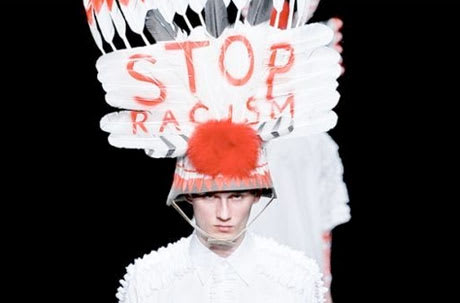While it's not an outright ban on wearing them, the UK's Glastonbury Festival has agreed to outlaw the sale of First Nations-styled headdresses at the event.
The protest against the misappropriation of the ceremonial item, often worn around festival grounds in the name of fashion, was instigated by UK resident Daniel Round earlier in the summer when he launched an online petition requesting Glastonbury "lead the way this side of the pond in raising awareness of the issues surrounding the wearing of feathered headdresses."
As the Guardian reports, after yielding just 65 signatures for the cause, Round now confirms that he's heard from festival organizers, who have pledged to keep headdresses from being sold on festival grounds at merchandise booths. This move does not, however, prevent festivalgoers from wearing a headdress onto the Glastonbury site.
"Our petition, small in numbers but passionate in support, pushed this issue right up to [Glastonbury co-organizer] Emily Eavis, and she listened," Round reported in an update. "From next year, alongside candle flares and flags, Native American style headdresses will not be on sale at Glasto stalls."
Despite Round's reports, neither Eavis nor any other Glastonbury organizers has publicly addressed the decision. The event's website, however, now lists "Indian headdresses" on its "traders section" as an item that cannot be sold "without prior authorisation or discussion with the markets' management." The list also includes cigarettes, alcohol, "candle flares" and flags.
"Although it is only one UK festival, I hope that if we spread the news of Glastonbury's decision on-line, positive discussions about the stereotyping of Native Americans and the headdress will grow in the UK and elsewhere," Round added in his update.
Glastonbury's stance on headdresses comes in the wake of Merritt, BC's Bass Coast Festival's decision to ban the wearing of ceremonial headdresses ahead of the event last August.
Organizers had wrote at the time, "We understand why people are attracted to war bonnets. They have a magnificent aesthetic. But their spiritual, cultural and aesthetic significance cannot be separated."
The protest against the misappropriation of the ceremonial item, often worn around festival grounds in the name of fashion, was instigated by UK resident Daniel Round earlier in the summer when he launched an online petition requesting Glastonbury "lead the way this side of the pond in raising awareness of the issues surrounding the wearing of feathered headdresses."
As the Guardian reports, after yielding just 65 signatures for the cause, Round now confirms that he's heard from festival organizers, who have pledged to keep headdresses from being sold on festival grounds at merchandise booths. This move does not, however, prevent festivalgoers from wearing a headdress onto the Glastonbury site.
"Our petition, small in numbers but passionate in support, pushed this issue right up to [Glastonbury co-organizer] Emily Eavis, and she listened," Round reported in an update. "From next year, alongside candle flares and flags, Native American style headdresses will not be on sale at Glasto stalls."
Despite Round's reports, neither Eavis nor any other Glastonbury organizers has publicly addressed the decision. The event's website, however, now lists "Indian headdresses" on its "traders section" as an item that cannot be sold "without prior authorisation or discussion with the markets' management." The list also includes cigarettes, alcohol, "candle flares" and flags.
"Although it is only one UK festival, I hope that if we spread the news of Glastonbury's decision on-line, positive discussions about the stereotyping of Native Americans and the headdress will grow in the UK and elsewhere," Round added in his update.
Glastonbury's stance on headdresses comes in the wake of Merritt, BC's Bass Coast Festival's decision to ban the wearing of ceremonial headdresses ahead of the event last August.
Organizers had wrote at the time, "We understand why people are attracted to war bonnets. They have a magnificent aesthetic. But their spiritual, cultural and aesthetic significance cannot be separated."




